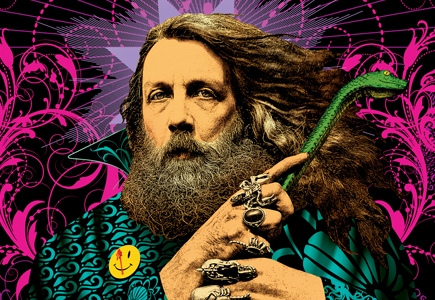Alan Moore: Art is Magic
“In order to be able to make it you have to put aside the fear of failing and the desire of succeeding. You have to do these things completely purely without fear, without desire. Because things that we do without lust or result are the purest actions that we shall ever take.” -Alan Moore
I have a great appreciation for Alan Moore. It is an
inarguable fact that he helped transform the medium of comic books into
something quasi-respectable. His run on Swamp Thing alone brought a new
consciousness to comics. With the help of the inimitable illustrator J. H.
Williams III, he created my all time favorite series Promethea. He is the
architect behind Watchmen, V for Vendetta, The League of Extraordinary
Gentlemen and From Hell (if you’ve only seen these works adapted as film, you
have not experienced the genius of Alan Moore). However, as much as I love Alan
Moore the writer, I am most interested in the Alan Moore the magician. Last
night I watched The Mindscape of Alan Moore and was amazed. This documentary is
a fascinating journey, as Moore narrates his humble beginnings and meteoric
climb to fame as well as his opinions on a variety of topics including art,
culture, religion, and something really weird called information doubling.
In 1993, when Alan Moore turned 40, he declared himself a
magician, and revealed that he worshiped the Roman snake god Glycon. He saw
this new identity as a natural progression of his role as a writer, saying:
"I believe that magic is art, and that art, whether that be music, writing, sculpture, or any other form, is literally magic. Art is, like magic, the science of manipulating symbols, words or images, to achieve changes in consciousness… Indeed to cast a spell is simply to spell, to manipulate words, to change people’s consciousness, and this is why I believe that an artist or writer is the closest thing in the contemporary world to a shaman."
And what does he consider the role of an artist to be?
"It is not the job of artists to give the audience what the audience wants. If the audience knew what they needed, then they wouldn’t be the audience. They would be the artist. It is the job of artists to give the audience what they need."
And what does the audience need? Moore delves into the
philosophical tradition of the practitioners of alchemy for an answer:
"The alchemists had two components to their philosophy. These were the principles of Solvé et Coagula. Solvé was basically the equivalent of analysis, it was taking things apart to see how they worked. Coagula was basically synthesis, it was trying to put disassembled pieces back together, so that they worked more efficiently. These are two very important principles which can be applied to almost anything in culture. There has recently in literature for example been a wave of post-modernism, deconstructionism. This is Solvé. Perhaps it is time in the arts for a little more Coagula. Having deconstructed everything, perhaps we really should be starting to think about putting everything back together."
That is an interesting consideration. How would one go about
doing that? What ways does art assist us in this process? Leave your comments below. I’d love to get a
conversation going about this.
See you all tomorrow.
Buh-bye.




Comments
Post a Comment